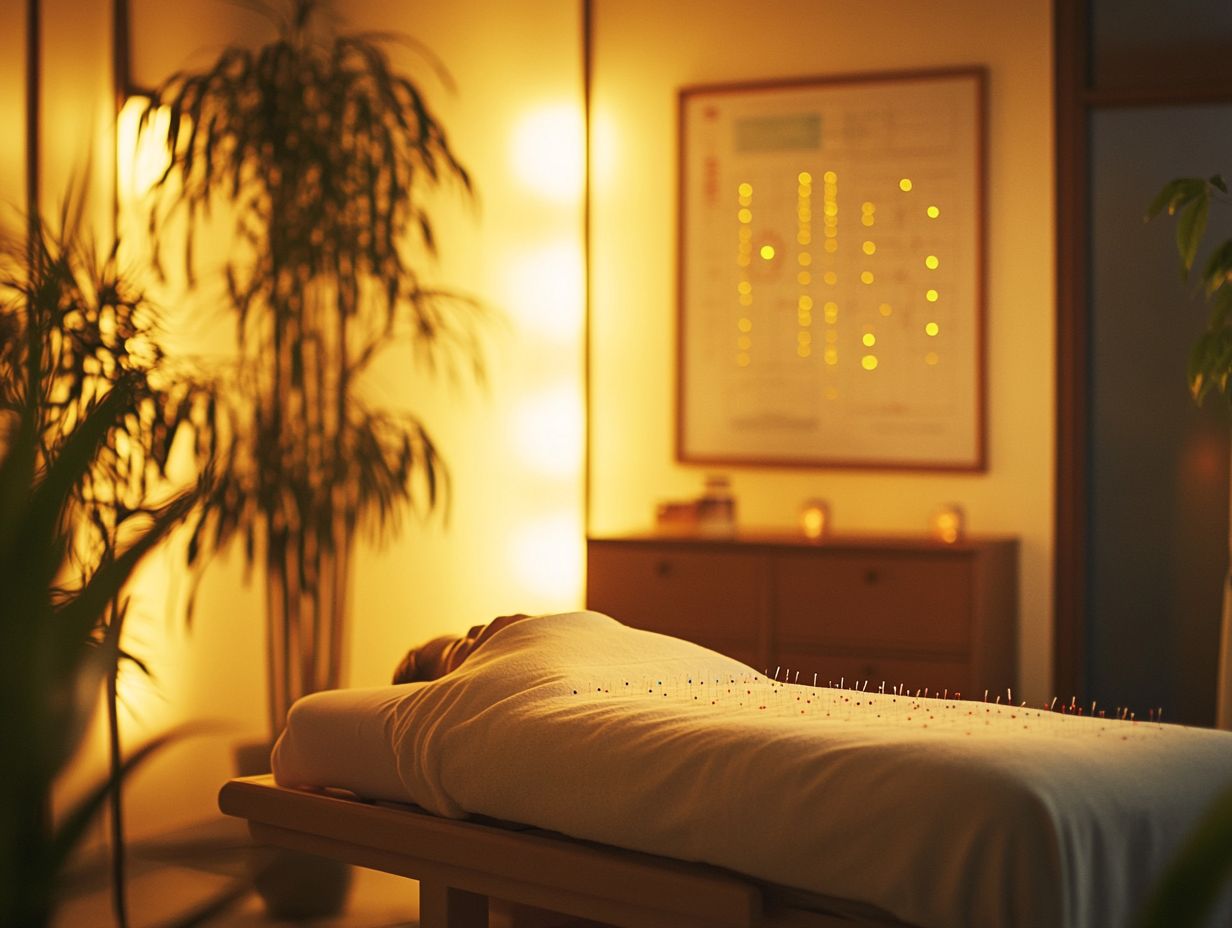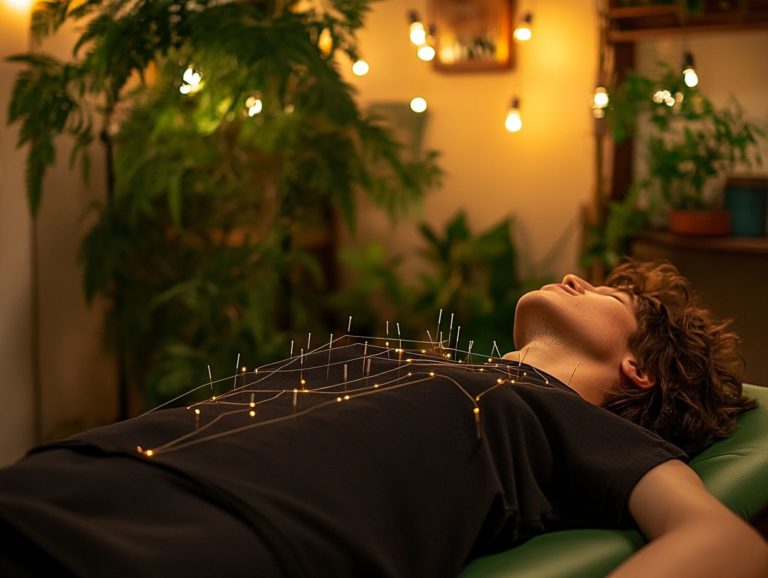Acupuncture’s Effect on Hormonal Imbalances
Hormonal imbalances can profoundly influence your well-being, presenting a range of symptoms that disrupt your daily life. Understanding the underlying causes and recognizing these symptoms is your first step toward seeking effective treatment.
Explore how acupuncture may serve as a key player in restoring your hormonal balance. You will find out what to expect during a session and learn about natural remedies that can support your wellness journey.
Join in as you uncover a holistic approach to managing your hormonal health.
Contents
- Key Takeaways:
- Understanding Hormonal Imbalances
- The Role of Acupuncture in Balancing Hormones
- Common Hormonal Conditions Treated with Acupuncture
- What to Expect During an Acupuncture Session
- Other Natural Remedies for Hormonal Imbalances
- Frequently Asked Questions
- What is acupuncture and how does it affect hormonal imbalances?
- Can acupuncture help with specific hormonal imbalances, such as PCOS or thyroid issues?
- How many acupuncture sessions are typically needed to see results for hormonal imbalances?
- Are there any side effects or risks associated with acupuncture for hormonal imbalances?
- Is acupuncture a standalone treatment for hormonal imbalances or should it be combined with other forms of treatment?
- Is acupuncture suitable for everyone with hormonal imbalances?
Key Takeaways:

Acupuncture has been shown to effectively balance hormones by stimulating the body’s natural healing mechanisms and improving blood flow to the endocrine glands. It can be a beneficial treatment option for conditions such as menstrual irregularities, PCOS, and menopause, without the potential side effects of medication. You can also make dietary and lifestyle changes, along with incorporating herbal supplements, to help naturally regulate hormones and improve overall well-being.
Understanding Hormonal Imbalances
Hormonal imbalances can profoundly impact your health, manifesting as mood disorders, menstrual irregularities, and even infertility. Conditions like PCOS and menopause often find their roots in these imbalances, triggering a cascade of symptoms that can disrupt your daily life.
Understanding the underlying causes and symptoms of hormonal imbalances is essential for effective treatment. This is especially true when exploring integrative approaches such as acupuncture and lifestyle modifications.
When hormones like estradiol and progesterone are out of balance, complications can arise that necessitate professional intervention and personalized treatment strategies tailored to your needs.
Causes and Symptoms
A multitude of factors can contribute to hormonal imbalances, such as poor dietary choices, chronic stress, and irregular lifestyle habits. Symptoms may include fatigue, menstrual irregularities, and anxiety.
These imbalances often manifest when your body s intricate endocrine system is thrown off balance, frequently due to excessive stress that prompts your adrenal glands to churn out cortisol. Over time, this can set off a chain reaction, leading to mood swings and intensified feelings of anxiety.
Inadequate nutrition particularly a deficit in essential fatty acids or vitamins can severely impede your body s ability to produce hormones efficiently. This disruption can lead to digestive issues and even problems with fertility.
Spotting these symptoms early can change your health journey!
The Role of Acupuncture in Balancing Hormones
Discover how acupuncture can transform your hormonal health! Acupuncture presents a refined, holistic approach to addressing hormonal imbalances by enhancing the flow of energy throughout your body. This technique not only aids in restoring balance to hormone levels but also elevates your overall health.
Rooted in traditional Chinese medicine, it recognizes that various health conditions from mood disorders to digestive issues can be influenced by the intricate pathways of energy within the body. By focusing on specific acupuncture points, practitioners skillfully mitigate the effects of hormone imbalances, paving the way for improved fertility, more regular menstrual cycles, and enhanced emotional well-being.
How Acupuncture Works
Acupuncture works by stimulating specific points on your body, enhancing the flow of energy to promote relaxation and mitigate the effects of stress hormones. For those interested in this therapy, learning about how acupuncture helps with hormonal balance ultimately addresses hormonal imbalances.
This ancient practice activates your body’s natural healing processes, encouraging a balanced energy flow that effectively counteracts both emotional and physical stressors.
By improving circulation, acupuncture nourishes vital organs and assists in removing toxins, contributing to better hormonal regulation.
As tension melts away and your body finds its calm, you may discover relief from symptoms linked to hormonal fluctuations, such as mood swings and fatigue.
Regular acupuncture sessions can cultivate a centered harmony within you. This enables your body to respond more adeptly to changes and enhances your overall well-being.
Ready to take control of your hormonal health? Schedule your acupuncture session today!
Benefits for Hormonal Imbalances

The benefits of acupuncture for hormonal imbalances are truly remarkable. You may experience improved mood and more regulated menstrual cycles.
It can also increase success in infertility treatments. This is thanks to acupuncture’s unique ability to stimulate endorphin release and alleviate stress.
This ancient practice not only helps balance hormones but also fosters relaxation, offering a holistic approach to your overall health. If you re grappling with anxiety or mood swings stemming from hormonal fluctuations, acupuncture can dramatically boost your mood and sense of calm.
For those navigating fertility therapies, it provides essential support by boosting blood flow to the reproductive organs, improving egg quality, and preparing the body for conception.
The physiological effects of acupuncture can also lead to better sleep patterns and reduced PMS symptoms, making it a valuable addition to any wellness regimen focused on hormonal health.
Common Hormonal Conditions Treated with Acupuncture
Acupuncture has proven effective in addressing various hormonal conditions, such as menstrual irregularities, polycystic ovary syndrome (PCOS), and menopause.
This makes it an invaluable treatment option for many women seeking holistic solutions to their health challenges.
Menstrual Irregularities
Menstrual irregularities, marked by unpredictable cycles and discomfort, can often be effectively managed through acupuncture, a practice renowned for restoring hormonal balance.
This ancient technique goes beyond merely alleviating physical pain; it also tackles the emotional ups and downs that often accompany the menstrual cycle.
With precise needle placements, acupuncture enhances blood circulation and stimulates hormone production, paving the way for more regular ovulation.
Many individuals find that it reduces the intensity of cramps, bloating, and mood swings, transforming their monthly experience into something far more manageable.
By cultivating a serene and balanced physiological state, acupuncture acts as a complementary therapy, enhancing overall well-being and enabling those facing menstrual challenges to reclaim control over their health.
Polycystic Ovary Syndrome (PCOS)
Acupuncture has demonstrated noteworthy effectiveness in treating Polycystic Ovary Syndrome (PCOS), skillfully addressing the hormonal imbalances that lead to challenges like irregular periods and infertility.
By enhancing blood circulation and supporting the body s natural healing processes, this time-honored Chinese medicine technique targets specific points associated with endocrine regulation.
Research indicates that acupuncture may improve how your body responds to insulin, a vital aspect for many women facing the complexities of PCOS. It also helps lower stress levels, which can further disrupt hormonal equilibrium.
As a result, you may find yourself experiencing more regular menstrual cycles and an overall boost in fertility, making acupuncture a promising alternative or complementary option in managing PCOS symptoms.
Menopause
During menopause, you may find yourself grappling with hormonal imbalances that bring about uncomfortable symptoms. Acupuncture can serve as a natural remedy to effectively alleviate these issues.
This time-honored Chinese practice involves the gentle insertion of fine needles into specific points on your body, helping to restore harmony and regulate your hormonal levels.
If hot flashes are part of your experience, acupuncture can help cool your internal temperature and ease those sudden waves of heat.
It also plays a vital role in stabilizing mood swings. This can help lift your mood by boosting endorphin levels.
Additionally, acupuncture can address sleep disturbances often encountered during menopause, allowing you to achieve a more restful night’s sleep and improve your overall quality of life.
What to Expect During an Acupuncture Session

During an acupuncture session, you can anticipate a serene atmosphere where skilled practitioners use specific techniques to address areas of your body linked to hormonal imbalances. This approach enhances relaxation and fosters healing.
These sessions typically last 30 to 60 minutes. During this time, fine needles are gently inserted at specific points, stimulating energy pathways and helping to alleviate symptoms related to stress, infertility, and musculoskeletal pain.
Process and Techniques Used
The process of acupuncture involves inserting thin needles at specific points, using different methods designed to enhance relaxation and effectively target hormonal imbalances.
One notable method is dry needling, which targets trigger points within muscle tissue to relieve tension that can affect hormonal pathways. Auricular acupuncture, on the other hand, focuses on points in the ear that have shown effectiveness in reducing stress and promoting emotional well-being both essential for maintaining hormonal health.
Practitioners utilize these methods to alleviate symptoms linked to hormonal fluctuations and provide comprehensive support for conditions such as PCOS and menopause.
By understanding these different acupuncture techniques, you empower yourself to seek holistic solutions for your hormonal challenges.
Other Natural Remedies for Hormonal Imbalances
Don t wait! Explore other natural remedies to balance your hormones now. These remedies can significantly contribute to addressing hormonal imbalances and enhancing your overall health.
Consider incorporating dietary adjustments, making lifestyle changes, and utilizing herbal supplements. Each of these elements plays a crucial role in your journey toward optimal well-being.
Diet and Lifestyle Changes
Making simple dietary and lifestyle changes can dramatically improve your hormonal health! A balanced diet rich in whole foods like fruits, vegetables, healthy fats, and lean proteins nourishes your body and supports hormonal balance.
Regular physical activity, such as yoga or strength training, benefits your physical health and lowers cortisol levels, boosting your mood.
Stress management techniques, including mindfulness meditation or deep breathing exercises, cultivate calm and stability in your life. Prioritizing quality sleep is equally crucial; it allows your body to repair itself and regulate hormone production, paving the way for improved health and vitality.
Herbal Supplements
Herbal supplements, rooted in traditional Chinese medicine, offer valuable support in managing hormonal imbalances and enhancing overall well-being.
Natural remedies like maca root, ashwagandha, and red clover are popular not just for their hormone-regulating properties but also for their synergistic effects when paired with treatments like acupuncture.
Maca root is celebrated for boosting energy levels and alleviating menopausal symptoms. Ashwagandha plays a crucial role in reducing stress, a notorious disruptor of hormonal balance. Red clover is particularly beneficial for women navigating menopausal symptoms due to its phytoestrogen content.
By incorporating these herbal supplements into your holistic wellness plan, you may amplify the benefits of acupuncture, making your body more receptive to treatment and creating a comprehensive approach to achieving harmony in hormonal health.
Frequently Asked Questions

What is acupuncture and how does it affect hormonal imbalances?
Acupuncture is a form of traditional Chinese medicine that involves inserting thin needles into specific points on the body to balance the flow of energy. It has been found to be effective in regulating hormones by stimulating the body’s natural healing processes and promoting better overall functioning.
Can acupuncture help with specific hormonal imbalances, such as PCOS or thyroid issues?
Yes, acupuncture has been shown to be beneficial in managing specific hormonal imbalances such as PCOS (which stands for polycystic ovary syndrome) and thyroid issues. By targeting specific points on the body, acupuncture can help regulate hormone levels and improve symptoms associated with these conditions.
How many acupuncture sessions are typically needed to see results for hormonal imbalances?
The number of sessions varies by individual and condition severity. For many, 1-2 sessions per week for 6-8 weeks may lead to noticeable improvements.
Are there any side effects or risks associated with acupuncture for hormonal imbalances?
Acupuncture is generally safe. Some may feel mild bruising or soreness, but this usually heals quickly. Always consult a licensed acupuncturist to ensure safety.
Is acupuncture a standalone treatment for hormonal imbalances or should it be combined with other forms of treatment?
Acupuncture can stand alone as a treatment. However, combining it with dietary changes or herbal medicine often leads to better results.
Is acupuncture suitable for everyone with hormonal imbalances?
Acupuncture may not suit everyone, especially pregnant women or those with certain health issues. Always talk to a licensed acupuncturist to see if it s right for you.






